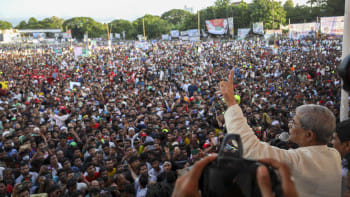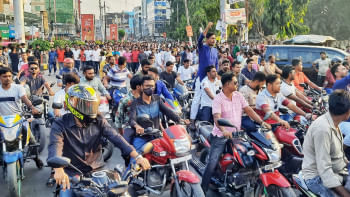The heat is on, but cooler heads must prevail before election

Amid a flurry of public rallies by major political parties and rekindled interest in the electoral fate of Bangladesh, it is cooler heads that must prevail. No one wants a repeat of the pre-2014 political violence or the pre-2018 ennui and despair. Nor will the mere appearance of an election, minus a healthy competition, be convincing for the people after two highly controversial national elections. The sooner the political establishment, especially the ruling party, understands that, the better.
Speaking of a healthy competition, it is not just on election day that it will be expected but also, equally importantly, on the campaign trail leading up to that day – something that the Election Commission must remember. That includes equal opportunity to organise political activities without any hindrance, official or unofficial, and equal participation in decisions related to the election. We must admit that the rallies recently organised by BNP have gone reasonably well, albeit with no shortage of impediments put in its way by entities loyal to Awami League. It has ushered in a long-forgotten period of street mobilisation by the opposition.
However, ahead of BNP's planned rally in Barisal on November 5, there were concerns that it might be denied permission to hold the rally in its preferred venue. The problem, apparently, was its failure to correctly name the venue in its letter to the deputy commissioner. What's in a name, you ask? But tension was allowed to linger for a while – and a senior AL leader even wryly suggested the possibility of application rejection – before permission was eventually granted. This attempt to latch onto a technicality could be interpreted as a desperate response to the massive showing in BNP's previous rallies.
It is perhaps no surprise then that what started as protests against hikes in prices of essentials and political repression would boil down to a contest of "street power", with Awami League holding/planning counter-rallies to flex its organisational muscle. An equally worrying fallout is BNP's hint, at its Rangpur rally, that its lawmakers are ready to resign from parliament "anytime soon".
BNP has only seven members in parliament – a symbolic presence, really, but one that gives it the opportunity to make its concerns known officially. But if it indeed goes ahead with this decision, we fail to see how it will benefit the party or the constituents of vacated seats, which will be duly filled. It will create no crisis in parliament, and no palpable pressure on the government. BNP will be wise not to pursue this course of action and turn its back on its voters. Its decision not to participate in any election under the present government is a political one, and must be pursued through political means.
While the recent vigorous opposition activities are a pleasant break from years of political hibernation, we must not lose sight of the bigger objectives: 1) restoring public trust in the electoral process through creating an ideal environment for election, with a level playing field ensured for all; 2) finding a solution to the lack of confidence over election-time government, and 3) enabling the EC to hold a fair election without any interference from the ruling establishment. The government and the EC must show their commitment to these overarching goals.

 For all latest news, follow The Daily Star's Google News channel.
For all latest news, follow The Daily Star's Google News channel. 







Comments